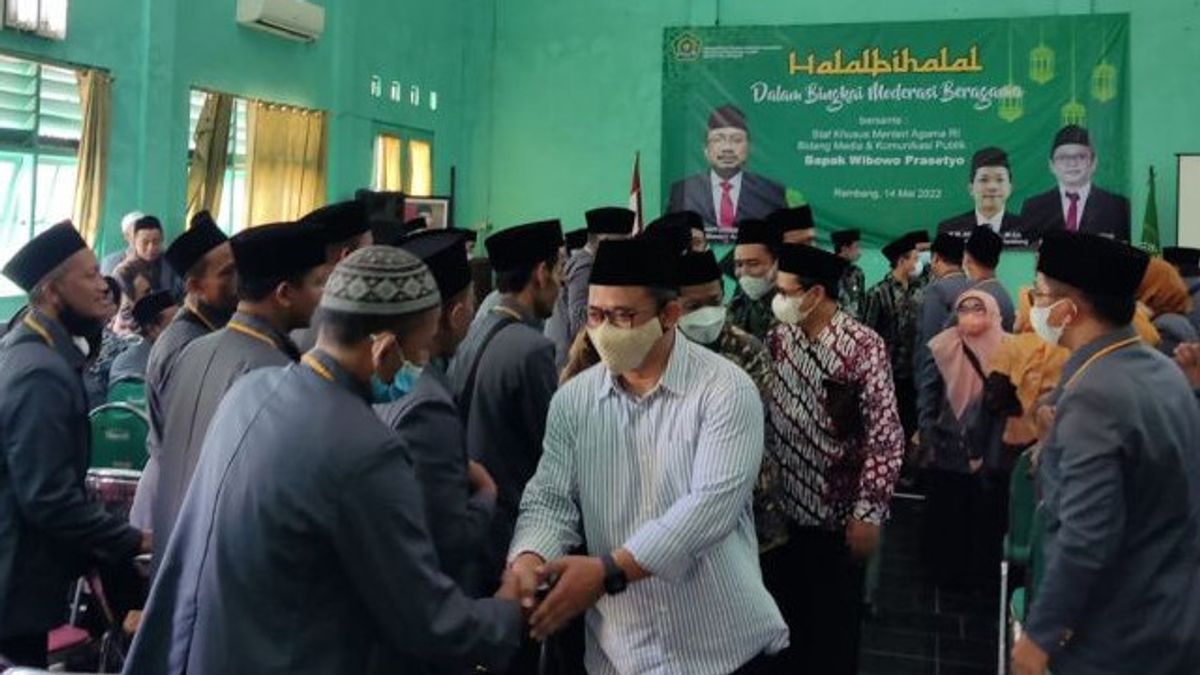JAKARTA - Special Staff of the Minister of Religion for Media and Public Communication, Wibowo Prasetyo, appreciates the preservation of the halal-bihalal tradition in Indonesia because it can strengthen social cohesion and strengthen moderation.
"Halalbihalal is a tradition that strengthens moderation or avoidance of extremes. Moderate religious understanding continues to develop in Indonesia, including the fruit of this tradition," Wibowo said when giving a speech at the "Halalbihalal in the Frame of Religious Moderation" in Rembang, Central Java, Saturday, May 14, quoted from Between.
The Halalbihalal which was held by the Ministry of Religion of Rembang Regency was attended by the Deputy Regent of Rembang Mochamad Hanies Cholil Barro, Head of the Rembang Ministry of Religion Office M. Fatah and their ranks, religious instructors as well as the heads and heads of the Religious Affairs Office (KUA) throughout the Rembang Regency.
According to Wibowo, there are four indicators of strengthening religious moderation, namely anti-violence, national commitment, tolerance, and tradition-friendly.
Meanwhile, the halal-bihalal tradition is one of the typical Indonesian traditions that must be preserved. Halalbihalal is also the face of tolerant Indonesia, mutual respect for fellow believers.
"There is no barrier in halal-bihalal because all religious adherents forgive each other regardless of one's status or religion. So Eid is also for all," he said.
He explained that halalbihalal is defined as forgiveness after performing the fasting worship of Ramadan, which is usually held in a place by a group of people.
Wibowo explained that although halal bihalal is typical of Indonesia, it comes from Arabic which is not commonly used by Arabic speakers.
"Historically, the term halalbihalal was raised by the muassis jami'iyyah of NU Kiai Haji Wahab Chasbullah, as a substitute for the word silaturahim which is considered normal, to resolve conflicts between political figures during the reign of President Soekarno," he said.
This context, he said, further emphasizes the substance of religious moderation in halal-bihalal, both in terms of national commitment, non-violence, and tolerance.
"That the potential for conflict needs to be managed properly so that it does not diminish national commitment, does not lead to acts of violence, and can instead be turned into positive energy to continue to build tolerance," said Wibowo.
Through halalbihalal, it is hoped that there will be a change in the atmosphere from one situation to another. From frozen to liquid, from hard to easy, and from bound to detached. This meaning can be achieved, including by forgiving each other.
"Halalbihalal is very relevant as a momentum for strengthening religious moderation which is one of the priority programs of the Minister of Religion Yaqut Cholil Qoumas. Halalbihalal is a momentum for knitting brotherhood as well as capital in welcoming a political year that has begun to feel frenzied in the midst of Indonesia's diversity," he said.
He also reminded that differences are sunnatullah and cannot be denied. However, no matter how the differences exist, they must not lead to acts of violence, intolerance, or even to the point of eliminating national commitment. "It is our collective duty to continue to strengthen religious moderation," he said.
The English, Chinese, Japanese, Arabic, and French versions are automatically generated by the AI. So there may still be inaccuracies in translating, please always see Indonesian as our main language. (system supported by DigitalSiber.id)













